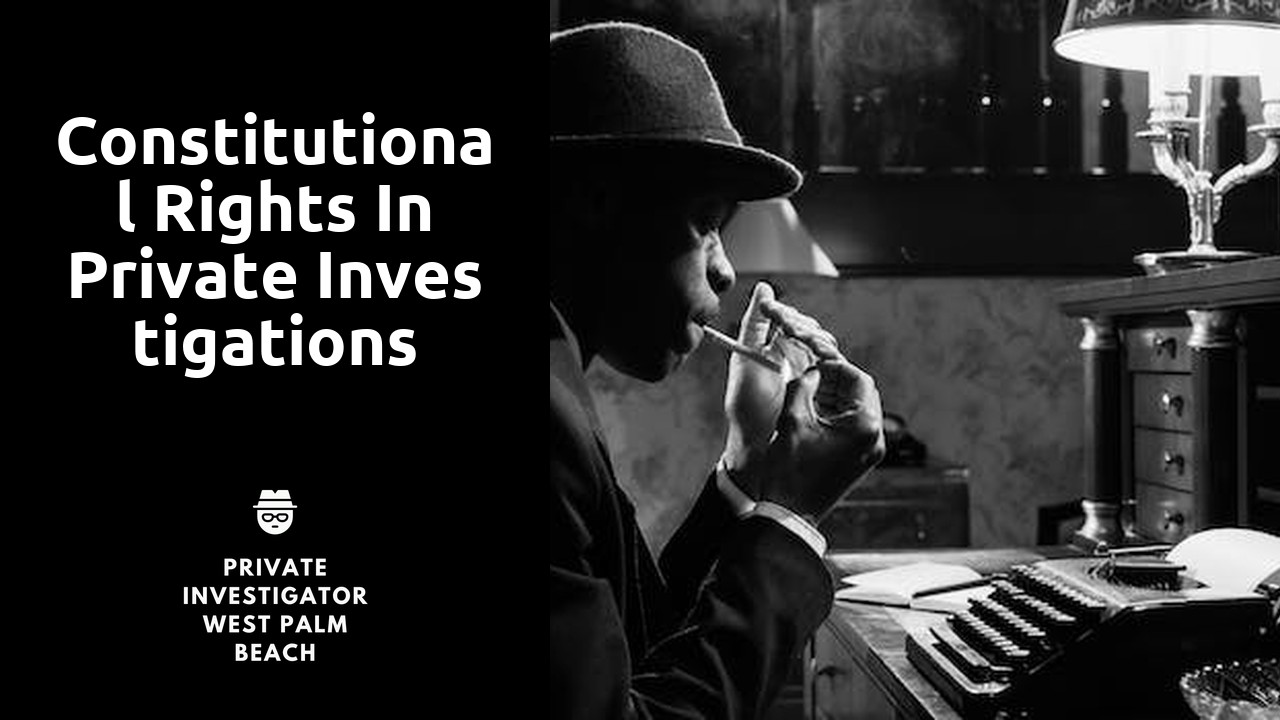
Constitutional Rights in Private Investigations
Safeguarding Individual Liberties: Navigating Private Investigations
Private investigations play a crucial role in safeguarding individual liberties, but it is important to navigate this process with caution. While the goal is to uncover the truth and ensure justice, it is equally vital to respect personal rights. Balancing investigative practices with the protection of civil liberties requires a delicate approach.
In the realm of private investigations, understanding the boundaries of personal rights is paramount. It is imperative to strike a balance between the need for information and respecting an individual's privacy. Uncovering the truth should not come at the expense of violating someone's rights. Therefore, investigators must adhere to ethical guidelines and legal boundaries to ensure that their actions are justified and avoid any potential backlash. By navigating this complex terrain responsibly, private investigators can uphold individual liberties while carrying out their essential work.
Uncovering the Balance: Personal Rights and Investigative Practices
Private investigations play a vital role in uncovering crucial information and facts that are often instrumental in legal proceedings. However, there is an inherent conflict between personal rights and investigative practices that needs to be carefully balanced. While it is essential to protect personal liberties and privacy, it is equally important to ensure that investigations can be conducted effectively to maintain law and order.
The challenge lies in finding the right balance between the two. On one hand, individuals have the right to privacy and protection from unwarranted intrusion into their personal lives. It is crucial that any investigative practices undertaken respect these rights and adhere to legal boundaries. At the same time, investigators need certain powers and tools to gather evidence and uncover the truth. Striking a balance that respects personal rights while allowing for effective investigative practices is a complex task that must be approached with careful consideration.
Ensuring Legal Boundaries: The Intersection of Privacy and Investigations
Privacy is a fundamental right that every individual should be able to enjoy. However, in today's digital age, the boundaries between privacy and investigations can become blurred. It is crucial to ensure that the legal framework surrounding private investigations is robust enough to protect individual liberties while allowing for the necessary tools to uncover the truth.
One of the key considerations when navigating the intersection of privacy and investigations is the need to strike a balance between individual rights and the interest of justice. It is essential for investigators to have the ability to gather evidence and conduct thorough investigations, but this must be done within the confines of the law. Any overreach or violation of privacy rights can undermine the integrity of the investigation and unjustly infringe upon an individual's liberties. Therefore, legal boundaries must be clearly defined and strictly adhered to in order to safeguard the rights of both the investigated and the investigator.
Preserving Civil Liberties: An Indepth Look at Private Investigations
Private investigations play a crucial role in uncovering the truth and maintaining the safety of individuals and society at large. However, it is equally important to ensure that these investigations do not encroach upon the civil liberties of individuals. Preserving civil liberties in the context of private investigations requires a delicate balance between upholding the principles of justice and protecting the rights of individuals.
One of the key aspects of preserving civil liberties in private investigations is the adherence to legal boundaries. Private investigators must operate within the limits set by law, ensuring that their actions are justified, legal, and ethical. This includes obtaining necessary permissions, respecting the privacy of individuals, and conducting investigations with a focus on facts and evidence. By staying within the legal boundaries, private investigators can provide valuable information while safeguarding the rights of individuals involved.
Protecting Citizens: Exploring the Rights of Individuals in Investigative Processes
Private investigations play a crucial role in safeguarding citizens and upholding their rights. As individuals navigate the intricate web of investigative processes, it is essential to explore and understand the rights that protect them. These rights not only empower individuals but also ensure that investigative practices remain within legal boundaries.
One fundamental right that individuals possess in investigations is the right to privacy. While investigations often require gathering sensitive information, it is imperative for investigators to strike a balance between their need for information and respecting an individual's right to privacy. This delicate balance ensures that citizens are protected from intrusive measures that could infringe upon their personal liberties. By recognizing and upholding privacy rights, investigative processes can maintain integrity and preserve the public's confidence in the system.
Unraveling the Legal Landscape: Constitutional Considerations in Private Investigations
In the ever-evolving field of private investigations, navigating the legal landscape is of utmost importance. Constitutional considerations play a crucial role in ensuring that the rights of individuals are protected throughout the investigative process. These considerations, rooted in the fundamental principles of the Constitution, guide investigators in striking a delicate balance between carrying out effective investigations and safeguarding individual liberties.
One key constitutional consideration is the Fourth Amendment, which protects individuals from unreasonable searches and seizures. Private investigators must adhere to the principles established by this amendment, ensuring that any search or seizure conducted is based on probable cause and supported by a warrant when required. This safeguard prevents investigators from overstepping their bounds and infringing upon the privacy rights of individuals. Additionally, the Fifth Amendment provides individuals with the right against self-incrimination, highlighting the need for investigators to respect the rights of those they are investigating. By paying careful attention to constitutional considerations, private investigators can carry out their work in a manner that upholds individual liberties while still achieving their intended objectives.
Related Links
Obtaining Consent for Recording ConversationsEthical Use of Surveillance Technology